North Korean Propaganda Summit Hits NYC
Radical activists and academics gathered at a tax-exempt church to call for revolution against the US—exposing a network of anti-U.S., pro-North Korea, and CCP-linked groups targeting young Americans
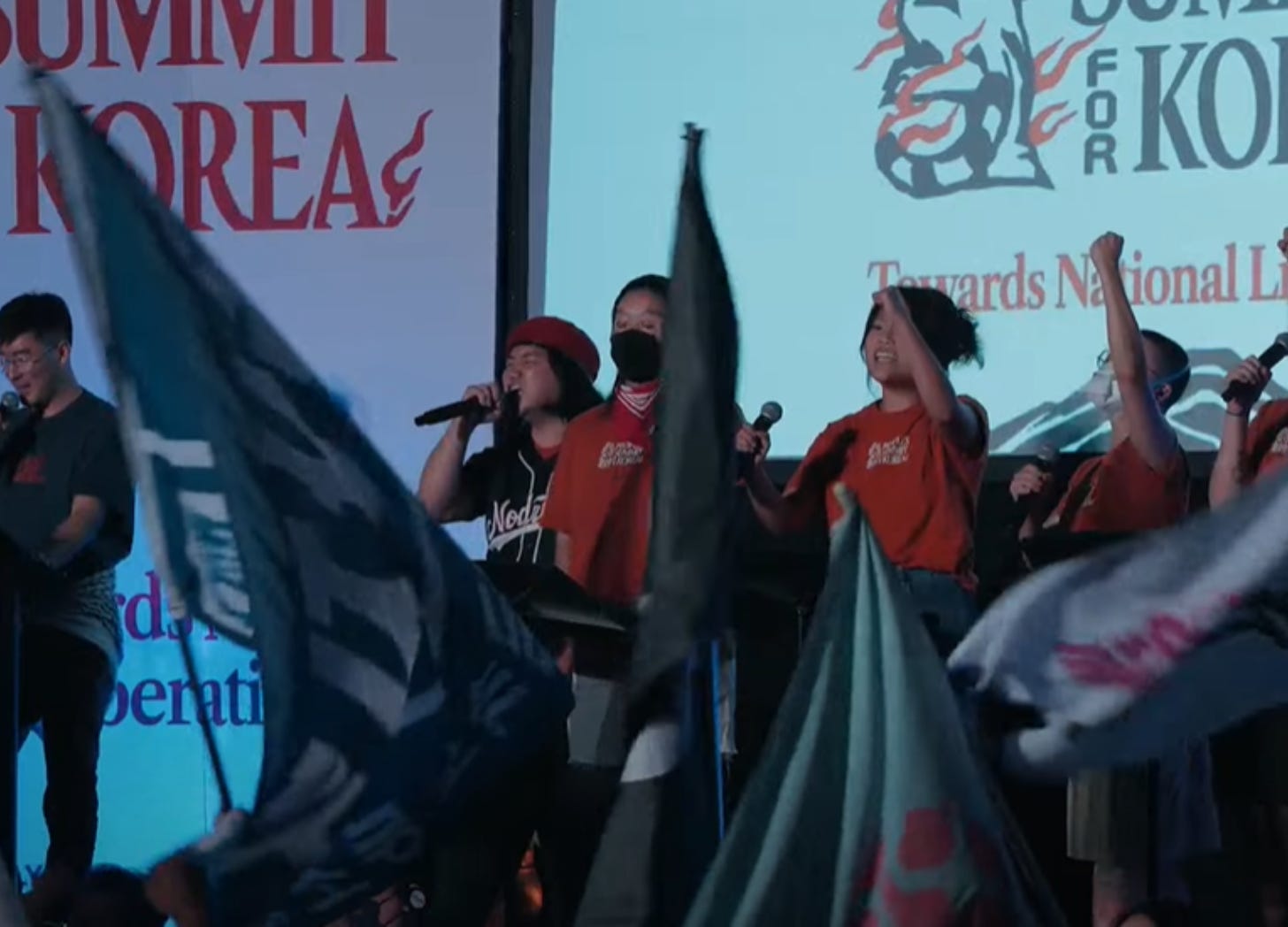
The three-day "People's Summit for Korea" held at New York City's Riverside Church from July 25-27, 2025, featured speakers openly calling for revolution against the United States, praising the ideology of North Korea’s regime, and advocating for the dismantling of US military presence in South Korea. Documented by citizen journalist Stu Smith (@thestustustudio), the conference showcased radical anti-American sentiments, with speakers explicitly aligning with North Korea while framing their agenda as "peace activism."
Calls for Dismantling US-South Korea Alliance
Mee-Hee Son, speaking through a translator, opened the conference with: "We pledge to stand in solidarity with and support the anti-imperialist national liberation struggles currently unfolding in Palestine, in Iran, and everywhere around the globe." She continued with explicit policy demands: "We're committed to advancing mass movements to halt U.S.–ROK–Japan joint military exercises, lift sanctions against North Korea, dismantle the fake UN Command, and establish a Korea peace agreement from an anti-imperialist perspective."
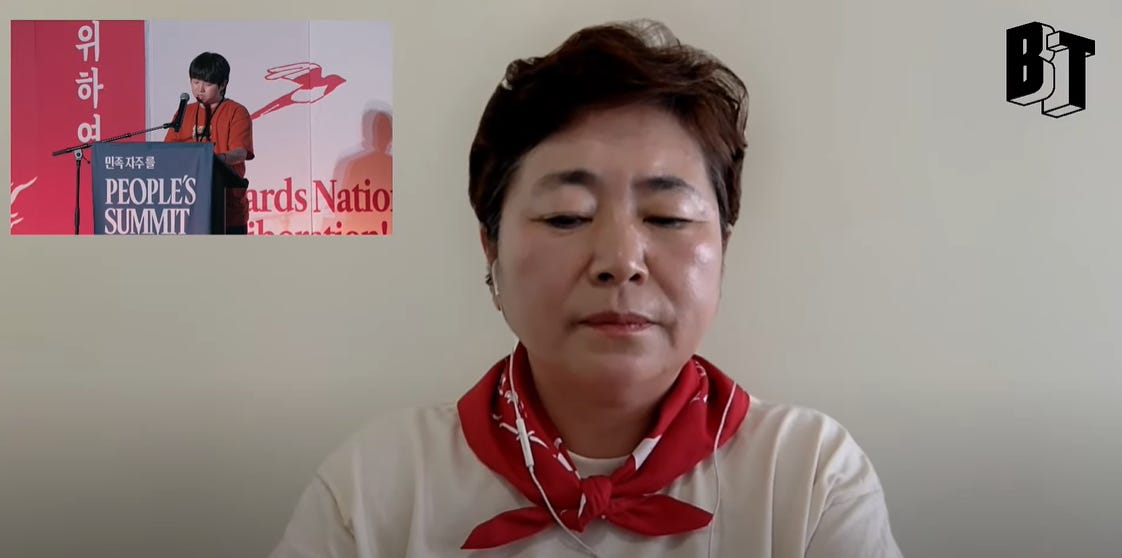
Tamara G. from the Palestine Youth Movement explicitly aligned Palestinian activists' opposition to the U.S. with North Korea's position, stating: "We look to the Korean struggle and its historical, foundational, and continued fight for national liberation and against U.S. imperialism... Like ours, it's a struggle for dismantling a U.S. imperial outpost and reuniting the land and the people."
Tamara further connects the movements, stating: "We are proud to take up this task with you all — until all of Palestine is liberated, and imperialism is nothing more than a footnote in history."
Revolutionary Calls to Action and Anti-US Rhetoric
The conference concluded with Simon Ma, a lead organizer with Nodutdol, delivering a final speech declaring that "true liberation in Korea can only be achieved by getting the U.S. out of Korea and putting an end to U.S. imperialism everywhere." Attendees ended the session by singing The Internationale, the anthem of global socialism, with Ma's parting words being "See you on the streets."
Mick Kelly, founding member of the Freedom Road Socialist Organization, delivered one of the most militant speeches, stating: "We have common enemies and we have a common interest in seeing them wiped out." Kelly characterized the United States as a "dying imperialist system" and emphasized that "a blow struck here [in the US] is a blow struck for other places as well," explicitly tying domestic revolutionary action to global outcomes.
Kelly also called for challenging U.S. anti-terrorism laws, arguing that they "criminalize international solidarity" and make it illegal to support groups in Lebanon and Palestine that he claims deserve American support—effectively advocating for the right to support organizations currently designated as terrorist groups by the U.S. government.
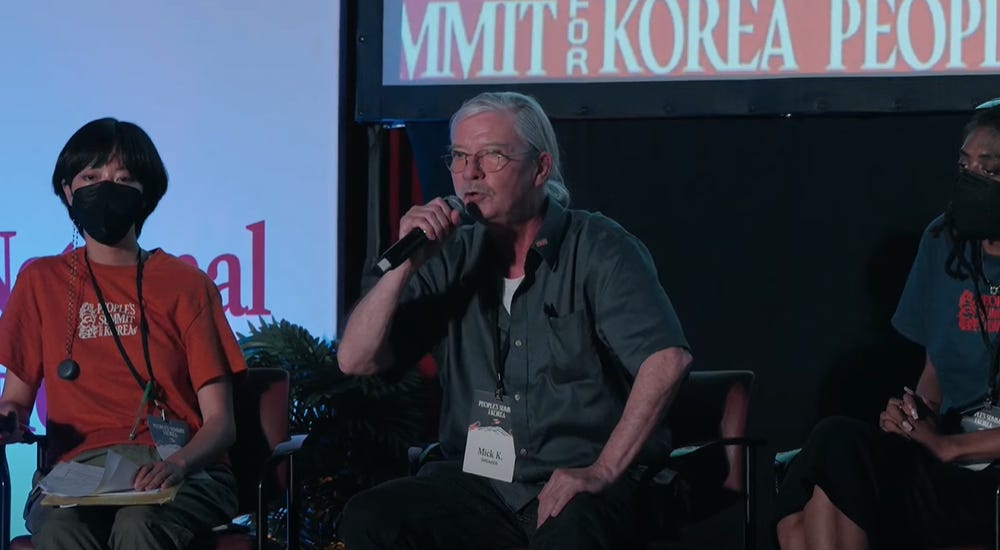
Praise for Hamas, Iran, and Terrorist Groups
Sara Flounders, a prominent member of the United National Antiwar Coalition (UNAC) with longstanding ties to the U.S.-designated terror group Samidoun, celebrated what she described as America's decline, calling Israel "the most important U.S. proxy." She openly praised Hamas's tunnel system in Gaza, boasting that "in 22 months [Israel] is unable to defeat the heroic Palestinian people who have built their weapons deep in tunnels out of repurposed Israeli missiles." Flounders also voiced explicit support for Iran's ballistic missile attacks against Israel, declaring: "Israel found they couldn't sustain 12 days of the Iranian response missiles, what an accomplishment."
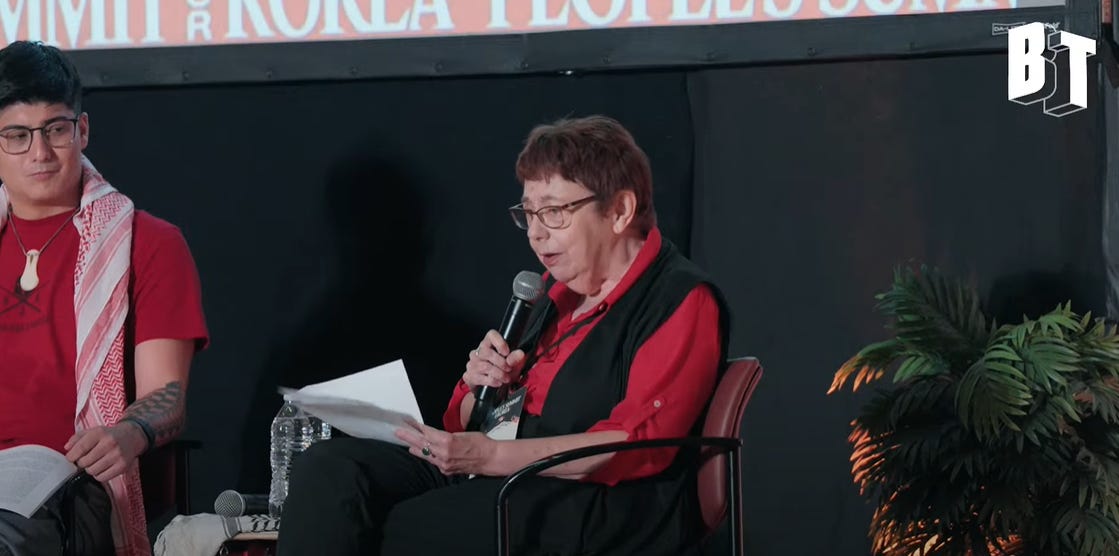
Ju-Hyun Park of Nodutdol dismissed concerns about North Korea's role in arming terrorist groups, framing them as merely "U.S. papers" worried about "the DPRK's role in that front." Park scoffed at well-documented evidence from UN reports, weapons interdictions, and missile forensics showing North Korea's arms trafficking to Hezbollah, Hamas, and the Houthis, instead characterizing such weapons transfers as a form of "solidarity"—a sentiment that received applause from the audience. Park further framed the Korean "national liberation struggle" and pro-Palestinian activism as a global fight for human survival.
Carlos Ron, a former Venezuelan diplomat and self-proclaimed revolutionary, spoke via Zoom to praise North Korea and celebrate what he described as a new world order led by America's adversaries, declaring: "Cuba, Venezuela, Iran, China, and Russia have been invaluable allies... for building a new world."
North Korean Ideology Promoted by Academic Figures
CUNY Baruch assistant professor Betsy Yoon urged American activists to embrace North Korea's Juche ideology, telling attendees: "If the DPRK can survive under sanctions and still... come up with a rural development plan, I feel like we as those who are living here in the Imperial core can put our heads together and figure out how to creatively apply our Juche spirit."
Simone Chun, a former Harvard researcher and Northeastern lecturer, described the Korean protest movement as "people's revolution," stating: "We do not have nuclear weapons... but what we have is weapons that are far stronger and more powerful than any weapons in the world. That is people's revolution." Chun directly blamed the United States for global instability, claiming "the threat of war is real. It is all prompted by the United States."
Anti-American Historical Revisionism
Vijay Prashad, former professor at Trinity College and current executive director of the Tricontinental Institute for Social Research, delivered what Smith described as a "blistering anti-American tirade" beneath artwork depicting Molotov cocktails. The Tricontinental Institute is funded by Roy Neville Singham, a financier with well-documented links to the Chinese Community Party (CCP).
Prashad mocked America as a "collapsing empire," stating: "The United States was defeated by Afghanistan. The United States was defeated by the Taliban. You can't beat the Taliban. You think you're going to defeat the Chinese? Are you crazy?"
He rejected the American narrative of World War II, claiming: "They would like you to think it was a group of Iowa farm boys who landed in Normandy and sort of haplessly showed up in Germany. Not true at all," instead crediting communist forces for victory. Prashad characterized the US as knowing "only two words: austerity and war. Austerity for their population and war for everybody else."
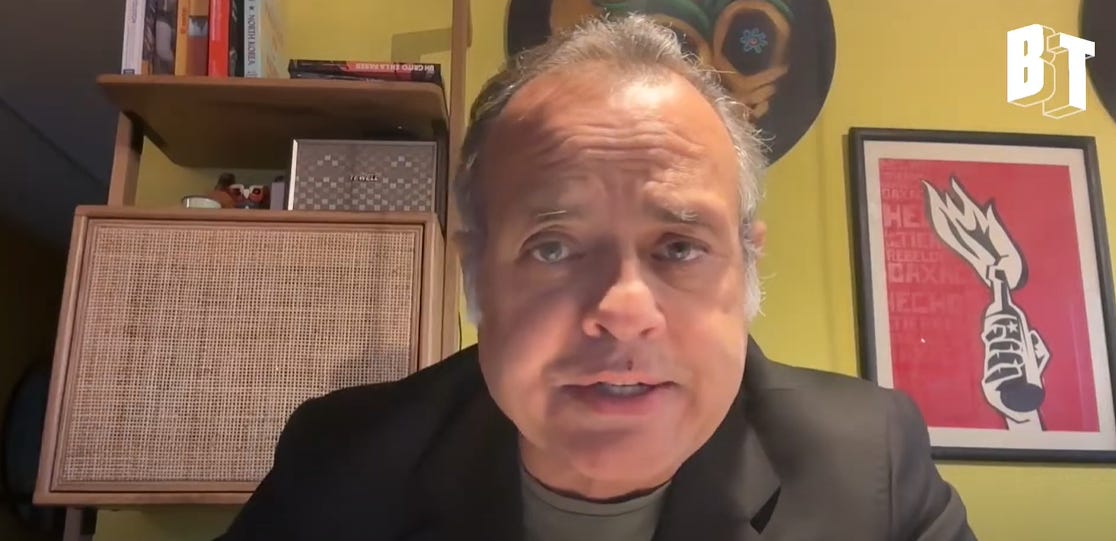
Reunification Under North Korean Terms
The People's Forum's Manolo De Los Santos delivered what Smith characterized as a "veiled pro-North Korea call for 'reunification,'" stating: "For decades, U.S. imperialism has relentlessly blocked Korea's path to peace, reunification and self-determination... deploying advanced weaponry and insidious political interference." His speech notably omitted any mention of North Korea's dictatorship or human rights abuses.
Kawenaʻulaokalā Kapahua, Political Education Chair of Hui Aloha ʻĀina (a Hawaiian independence party), linked his cause to Korea's, calling for "a free and socialist Korea and a free and independent Hawai'i" while claiming "every base we close weakens imperialism in the region."
A Convergence of Anti-American Ideologies
The People's Summit for Korea represents a significant convergence point for anti-U.S., anti-Israel, pro-North Korea, pro-Iranian regime, and pro-CCP speakers and organizations. Throughout the three-day event, these seemingly disparate movements demonstrated their shared ideological foundation: opposition to American influence globally and support for authoritarian regimes that position themselves against the United States.
From Palestinian activists drawing explicit parallels between their cause and North Korean "liberation," to academic figures funded by CCP-linked financiers promoting revolutionary rhetoric, to explicit solidarity with the Iranian regime, the summit revealed how these movements operate not as isolated causes but as a coordinated international network with shared targets and aligned objectives.


